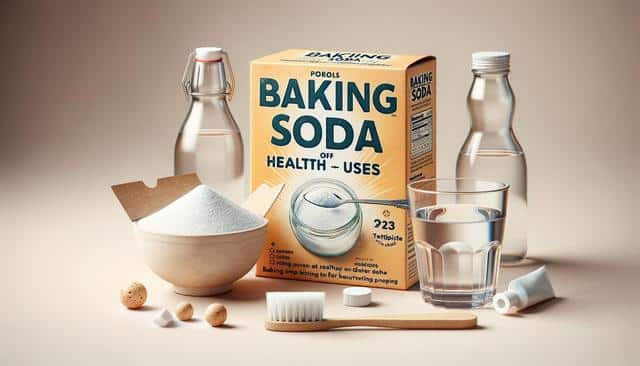
Exploring the Health Benefits of Baking Soda
Soothing Digestive Discomfort
One of the most well-known uses of baking soda in health is its ability to neutralize stomach acid. When consumed in small amounts mixed with water, baking soda can provide temporary relief from heartburn, acid indigestion, and upset stomach. Sodium bicarbonate reacts with stomach acid to produce carbon dioxide, which can help alleviate the burning sensation associated with acid reflux.
To use baking soda for digestive relief, mix about 1/2 teaspoon into a glass of water and sip slowly. However, this remedy should only be used occasionally, as frequent use may lead to imbalances in the body’s acid-base levels. Individuals with high blood pressure or those on sodium-restricted diets should consult a healthcare provider before trying this method.
Some potential benefits include:
- Quick relief from occasional heartburn symptoms
- Soothing of bloating and gas
- Support for balanced pH levels in the stomach
While effective in the short term, baking soda is not a replacement for long-term gastrointestinal care or prescribed medications. It’s best used as a temporary solution for mild symptoms.
Natural Oral Hygiene Support
Baking soda’s mildly abrasive texture and alkaline properties make it a popular choice for natural oral care. It helps remove surface stains on teeth, neutralize acids in the mouth, and freshen breath. Many people use it as a gentle toothpaste alternative or additive to improve their daily brushing routine.
When applied to a toothbrush, a small amount of baking soda can assist in polishing teeth and reducing plaque buildup. Additionally, its antibacterial qualities may contribute to a cleaner oral environment, potentially reducing the risk of gum disease and cavities.
Benefits of baking soda in oral care include:
- Whitening of teeth without harsh chemicals
- Neutralization of mouth acids that cause bad breath
- Reduction of plaque and gum irritation
Regular use should be done with care, as overuse may erode tooth enamel over time. It’s advisable to use baking soda no more than a few times a week and in combination with a fluoride toothpaste.
Skin Soothing and Personal Care
Baking soda is widely used in skin care for its calming, exfoliating, and odor-neutralizing properties. A paste made from baking soda and water can help alleviate minor skin irritations, such as insect bites, rashes, and mild sunburn. Its gentle exfoliating effect also helps in removing dead skin cells, leaving the skin feeling refreshed.
Many people also turn to baking soda as a natural deodorant. Its ability to absorb moisture and neutralize body odor makes it a practical alternative to conventional antiperspirants.
Common personal care uses include:
- Soothing itchy skin after insect bites or exposure to irritants
- Reducing inflammation associated with acne or razor burn
- Acting as a natural deodorizer for underarms and feet
However, those with sensitive skin should test a small area first, as baking soda may cause dryness or irritation in some individuals. Mixing it with other soothing ingredients like coconut oil or aloe vera can help minimize irritation.
Promoting Healthy Kidneys and pH Balance
In certain medical contexts, baking soda has been used to help support kidney function, particularly in individuals with chronic kidney disease (CKD). Sodium bicarbonate may help slow the progression of kidney damage by reducing the acidity of the blood, although this should only be done under the supervision of a healthcare provider.
Additionally, maintaining a balanced pH in the body is often cited as an important factor for general health. While the body naturally regulates its pH levels, some proponents believe that consuming alkaline substances like baking soda can support this internal balance, especially after strenuous exercise or consumption of acidic foods.
Possible advantages in this context may include:
- Supporting kidney health in medically supervised cases
- Reducing acid load from certain diets
- Enhancing performance recovery after intensive workouts
It’s essential to note that while baking soda may offer benefits, it is not a cure or substitute for prescribed medical treatments. Always consult a healthcare professional before using it for chronic health conditions.
Household Uses That Support Wellness
Beyond personal health, baking soda can promote a healthier home environment, indirectly supporting overall well-being. Its natural deodorizing and cleaning properties make it a staple in many households for maintaining hygiene without harsh chemicals.
Using baking soda as part of regular cleaning routines contributes to minimizing exposure to synthetic cleaning agents. For individuals with allergies or sensitivities, it offers a safer alternative for freshening spaces and cleaning surfaces.
Notable household uses include:
- Removing odors from shoes, refrigerators, and carpets
- Cleaning fruits and vegetables by soaking them in a baking soda solution
- Disinfecting surfaces and neutralizing acidic residues
These uses may not directly treat health conditions, but they contribute to a cleaner, safer living space, which is a key aspect of maintaining holistic wellness. As always, ensure proper storage and keep it out of reach of children to avoid accidental ingestion or misuse.
Conclusion: A Simple yet Versatile Wellness Tool
Baking soda, with its long-standing reputation and wide range of applications, remains a valuable addition to many personal and household routines. From easing occasional digestive discomfort to enhancing oral hygiene and skincare, its versatility is backed by its simplicity—pure sodium bicarbonate, free of additives.
While not a replacement for professional medical care, baking soda can be a helpful, cost-effective tool when used responsibly. Whether you’re looking to manage minor ailments or seeking natural alternatives in your wellness journey, understanding the proper uses and limitations of baking soda is key to making informed, health-conscious choices.


